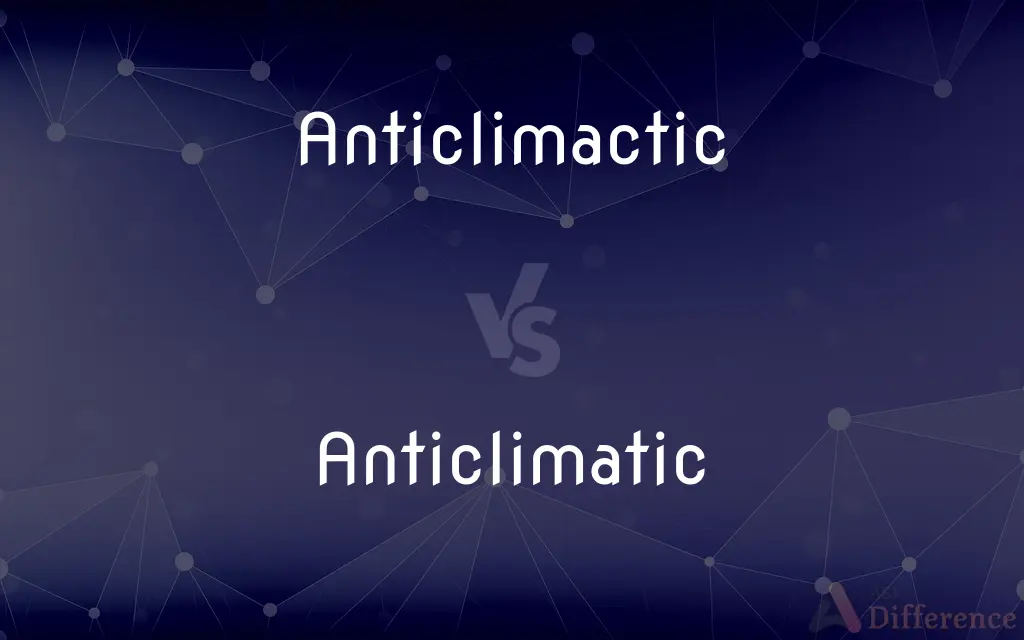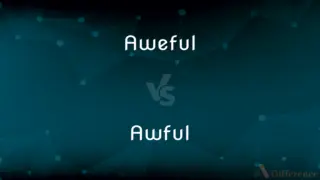Anticlimactic vs. Anticlimatic — Which is Correct Spelling?
By Tayyaba Rehman & Fiza Rafique — Updated on March 19, 2024
The correct spelling is "Anticlimactic," whereas the incorrect version is "Anticlimatic." Anticlimactic is an adjective used to describe something that's disappointingly unexciting.

Table of Contents
Which is correct: Anticlimactic or Anticlimatic
How to spell Anticlimactic?

Anticlimactic
Correct Spelling

Anticlimatic
Incorrect Spelling
ADVERTISEMENT
Key Differences
Relate the word to "dramatic," which also ends in "-matic" but is spelled differently in this case.
Focus on the root word "climax" to remember the "climact" part of "Anticlimactic."
Think of the word as anti-climactic, breaking it into segments to remember the "climactic" part.
Write it down multiple times to reinforce the correct spelling in your memory.
Use the phrase "An anticlimax is never automatic," reminding you of the "-actic" suffix.
ADVERTISEMENT
How Do You Spell Anticlimatic Correctly?
Incorrect: The buildup to the event was huge, but the outcome was rather anticlimatic.
Correct: The buildup to the event was huge, but the outcome was rather anticlimactic.
Incorrect: Everyone expected a dramatic reveal, but it turned out to be anticlimatic.
Correct: Everyone expected a dramatic reveal, but it turned out to be anticlimactic.
Incorrect: The final match of the season was surprisingly anticlimatic, considering the hype.
Correct: The final match of the season was surprisingly anticlimactic, considering the hype.
Incorrect: His speech concluded in an anticlimatic manner, without any strong finish.
Correct: His speech concluded in an anticlimactic manner, without any strong finish.
Incorrect: The ending of the movie was anticlimatic and left everyone feeling disappointed.
Correct: The ending of the movie was anticlimactic and left everyone feeling disappointed.
Anticlimactic Definitions
Anticlimactic describes an event or outcome that is less exciting or impactful than expected.
The movie had an anticlimactic ending.
Anticlimactic can describe an abrupt decline in emotional intensity or significance.
The speech concluded in an anticlimactic manner.
Anticlimactic refers to something that dampens or reduces enthusiasm or suspense.
The last chapter was anticlimactic after all the build-up.
Anticlimactic is used for emphasizing the contrast between expectation and reality.
The fireworks were anticlimactic compared to the hype.
Anticlimactic signifies an event, decision, or outcome that fails to satisfy.
The season finale was anticlimactic for fans.
Causing disappointment at the end of an exciting or impressive series of events
It was an anticlimactic finish to the match
A decline viewed in disappointing contrast with a previous rise
The anticlimax of a brilliant career.
Something trivial or commonplace that concludes a series of significant events
After a week of dramatic negotiations, all that followed was anticlimax.
A sudden change in speaking or writing from the impressive or significant to the ludicrous or inconsequential, or an instance of this, as in "He has seen the ravages of war, he has known natural catastrophes, he has been to singles bars" (Woody Allen).
Lacking climax, disappointing or ironically insignificant following of impressive foreshadowing.
After all the build up, the ending of the story was an anticlimactic letdown.
Of or relating to a sudden change from an impressive to a ludicrous style
Coming after the climax especially of a dramatic or narrative plot;
Everything after the discovery of the murderer was anticlimactic
Anticlimactic Meaning in a Sentence
The buildup to the new product launch was intense, but the actual event was anticlimactic.
The science fair was anticlimactic, with many projects left unfinished or not working.
The final episode of the series was surprisingly anticlimactic, tying up loose ends without any major twists.
The anticipated storm turned out to be anticlimactic, barely affecting the area.
The movie's climax was anticlimactic, resolving the main conflict too easily.
After months of hype, the concert ended in an anticlimactic way, with a simple thank you and goodnight.
Her long-awaited return to competitive swimming was anticlimactic as she finished last.
His attempt to break the world record was anticlimactic when he fell short by a wide margin.
Her presentation on groundbreaking research was anticlimactic, revealing well-known facts.
The championship game was anticlimactic, with the favored team winning by a landslide.
The quest for the ancient manuscript was anticlimactic when it turned out to be a modern replica.
The discovery of the supposed alien artifact was anticlimactic, proving to be a common rock.
The long-awaited software update was anticlimactic, offering only minor improvements.
The reveal of the secret project was anticlimactic, showing a minor update to existing technology.
Everyone expected a grand celebration, but the party was anticlimactic and ended early.
The grand opening of the new store was anticlimactic, featuring only a small ribbon-cutting ceremony.
The political rally was anticlimactic, with the main speaker canceling at the last minute.
The journey to the mountain peak was anticlimactic, obscured by fog at the summit.
The expedition to find the lost city was anticlimactic, leading only to already explored ruins.
The finale of the cooking competition was anticlimactic, with a unanimous and predictable victory.
Common Curiosities
Why is it called Anticlimactic?
It's called Anticlimactic because it describes something that's the opposite of a climax, meaning it's disappointingly unexciting.
What is the pronunciation of Anticlimactic?
/ˌænti.klaɪˈmæk.tɪk/
What is the root word of Anticlimactic?
Climax.
What is the plural form of Anticlimactic?
Anticlimactic is an adjective and doesn't have a plural form.
What is the verb form of Anticlimactic?
There is no direct verb form.
Is Anticlimactic an abstract noun?
No, it's an adjective.
Which conjunction is used with Anticlimactic?
"And," as in "disappointing and anticlimactic."
Which vowel is used before Anticlimactic?
Typically "an," as in "an anticlimactic event."
Which preposition is used with Anticlimactic?
"To," as in "anticlimactic to the audience."
What is the singular form of Anticlimactic?
Anticlimactic.
Is Anticlimactic a vowel or consonant?
It's a word, not a vowel or consonant.
Is the Anticlimactic term a metaphor?
No.
Is Anticlimactic a countable noun?
No, it's an adjective.
Is the word Anticlimactic a gerund?
No.
How do we divide Anticlimactic into syllables?
An-ti-cli-mac-tic.
What is a stressed syllable in Anticlimactic?
The fourth syllable, "mac."
What is the opposite of Anticlimactic?
Thrilling or climactic.
Is Anticlimactic a noun or adjective?
Adjective.
Is Anticlimactic a collective noun?
No.
Is the word Anticlimactic imperative?
No.
Is the word “Anticlimactic” a Direct object or an Indirect object?
Neither, it's an adjective.
What part of speech is Anticlimactic?
Adjective.
Which article is used with Anticlimactic?
"An," as in "an anticlimactic event."
Is Anticlimactic an adverb?
No.
How many syllables are in Anticlimactic?
5 syllables.
Is Anticlimactic a negative or positive word?
Generally negative.
What is another term for Anticlimactic?
Disappointing.
Which determiner is used with Anticlimactic?
"An," as in "an anticlimactic event."
How is Anticlimactic used in a sentence?
"The conclusion of the book was anticlimactic compared to its exciting beginning."
Share Your Discovery

Previous Comparison
Aweful vs. Awful
Next Comparison
Frolick vs. FrolicAuthor Spotlight
Written by
Tayyaba RehmanTayyaba Rehman is a distinguished writer, currently serving as a primary contributor to askdifference.com. As a researcher in semantics and etymology, Tayyaba's passion for the complexity of languages and their distinctions has found a perfect home on the platform. Tayyaba delves into the intricacies of language, distinguishing between commonly confused words and phrases, thereby providing clarity for readers worldwide.
Co-written by
Fiza RafiqueFiza Rafique is a skilled content writer at AskDifference.com, where she meticulously refines and enhances written pieces. Drawing from her vast editorial expertise, Fiza ensures clarity, accuracy, and precision in every article. Passionate about language, she continually seeks to elevate the quality of content for readers worldwide.














































